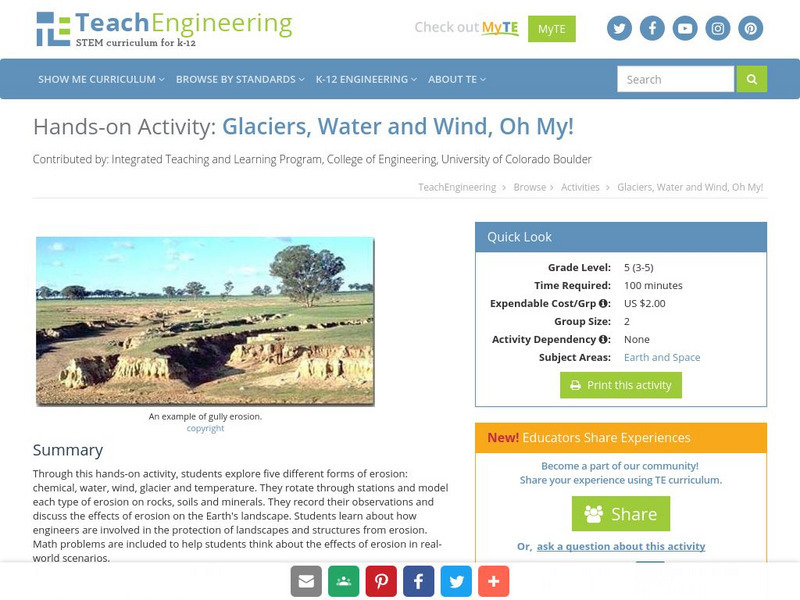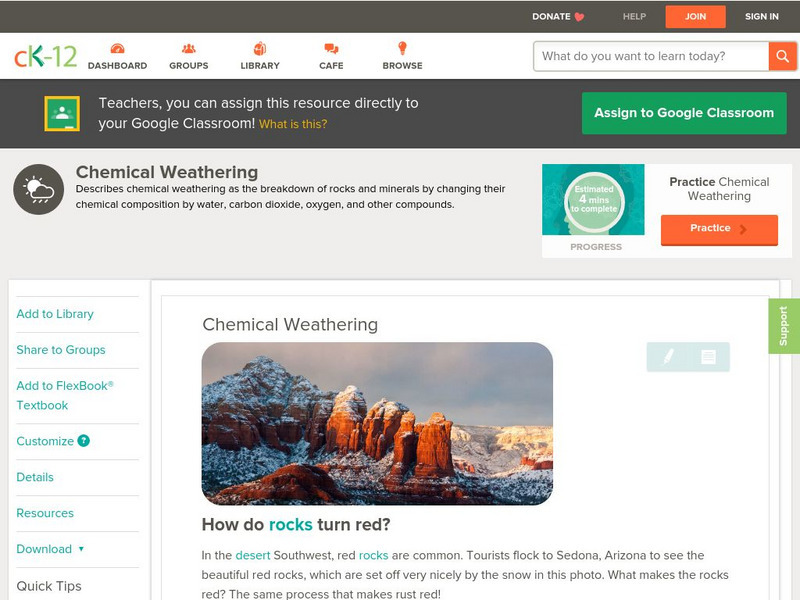TeachEngineering
Teach Engineering: Not So Neutral Views
Students are introduced to acids and bases, and the environmental problem of acid rain. They explore ways to use indicators to distinguish between acids and bases. Students also conduct a simple experiment to model and discuss the...
Texas Instruments
Texas Instruments: P H
Students use a pH sensor to measure the pH level of water in a stream or lake. They examine how air pollutants like sulphur dioxide, nitrogen oxides, and carbon dioxide cause acid rain, which affects the pH of water bodies and aquatic...
Science Education Resource Center at Carleton College
Serc: Epa's Environmental Education Center
A collection of fact sheets, brochures, and web pages about environmental issues. Topics include acid rain and air pollution, ecosystems, human health, waste and recycling, conservation, and water-related concepts and issues.
National Earth Science Teachers Association
Windows to the Universe: Air Pollution
What do smog, acid rain, carbon monoxide, fossil fuel exhausts, and tropospheric ozone have in common? They are all examples of air pollution. This article describes the causes and effects of air pollution.
American Geosciences Institute
American Geosciences Institute: Earth Science Week: Rock Pop
Students investigate the process of rock being eaten away by acid, thus releasing carbon dioxide into the air.
Bill Nye
Bill Nye: Acid Attack
Try this at-home science experiment to learn about chemical erosion and how it works.
Curated OER
Acid Rain
Explore this website and discover the wonders of lightning, thunder and rain. Students will have an opportunity to read a summary of the book "Lightning and Other Wonders of the Sky" and participate in some activities that correspond...
US Environmental Protection Agency
Epa: Observing Buffers in Lakes, Ponds, and Streams
Explore buffers in lakes, ponds, and streams. "In this experiment, you will observe the effects of limestone on the acidity of water."
Other
Moorland School: Earth Science Zone: The Earth's Atmosphere
Learn about the properties of the thin layer of gas that surrounds the Earth. Understand the mixture of gases that make up the atmosphere as well as the different layers. Also explained are issues that affect the atmosphere like the...
Ducksters
Ducksters: Environment for Kids: Water Pollution
Kids learn about water pollution and how it affects the environment and health. Study causes, pollutants, sources, and facts including acid rain.
US Environmental Protection Agency
Epa: Measuring the P H of Natural Water
How acidic is your water? "In this experiment, you will measure the pH of natural water located near your home or school."
US Environmental Protection Agency
Epa: Making a Natural P H Indicator
At this site you will find a step by step process for making a natural pH indicator. One of the main materials you need to have on hand is a red cabbage.
TeachEngineering
Teach Engineering: Air Pollution
Students are introduced to the concept of air quality by investigating the composition, properties, atmospheric layers and everyday importance of air. They explore the sources and effects of visible and invisible air pollution. By...
TeachEngineering
Teach Engineering: Engineering for the Earth
Young students are introduced to the complex systems of the Earth through numerous lessons on its natural resources, processes, weather, climate and landforms. Key earth science topics include rocks, soils and minerals, water and natural...
TeachEngineering
Teach Engineering: Introduction to Environmental Engineering
Students are presented with examples of the types of problems that environmental engineers solve, specifically focusing on air and land quality issues. Air quality topics include air pollution sources, results of poor air quality...
Ducksters
Ducksters: Environment for Kids: Air Pollution
Kids learn about air pollution and how it effects the environment and health. Study causes, pollutants, and facts including acid rain and smog.
TED Talks
Ted: Ted Ed: How to Create Cleaner Coal
It takes a lot of fuel to heat our homes, preserve our food, and power our gadgets. And for 40 percent of the world, cheap, plentiful coal gets the job done. But coal also releases pollutants into the air, causing environmental damage...
Georgia Department of Education
Ga Virtual Learning: Air, Atmosphere, and Climate Change
Sixteen essential questions lead student learning about Earth's atmosphere and global warming as they have to do with global climate change.
US Environmental Protection Agency
Epa: The Plain English Guide to the Clean Air Act
This 27-page booklet explains the Clean Air Act using everyday English.
Georgia Department of Education
Ga Virtual Learning: Ap Environmental Science: Air Pollution and Climate Change
Through this interactive module, students learn that the atmosphere is so much more than air, its complex role on Earth should be explored, and its quality carefully monitored and protected.
TeachEngineering
Teach Engineering: What's Hiding in the Air?
Students develop an understanding of the effects of invisible air pollutants with a rubber band and hanger air test and a bean plant experiment. They also learn about methods of reducing invisible air pollutants.
TeachEngineering
Teach Engineering: Glaciers, Water and Wind, Oh My!
This hands-on activity explores five different forms of erosion (chemical, water, wind, glacier and temperature). Students rotate through stations and model each type of erosion on rocks, soils and minerals. The students record their...
CK-12 Foundation
Ck 12: Earth Science: Chemical Weathering
[Free Registration/Login may be required to access all resource tools.] Chemical weathering wears down rocks through chemical reactions.
US Environmental Protection Agency
Epa: Measuring Soil P H
This site has an experiment to find out how to measure the pH of your soil. The soil pH is an important condition that can affect the health of plants and animals.
Other popular searches
- Effects of Acid Rain
- Acid Rain Lab
- Acid Rain Germination
- Make Acid Rain
- Acid Rain Videos
- Acid Rain Education
- Acid Rain and Atmosphere
- Making Acid Rain
- Acid Rain and Canada
- Litmus Paper Acid Rain
- Chernobyl Acid Rain
- Formation of Acid Rain






















